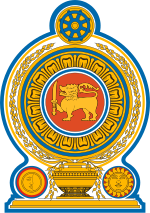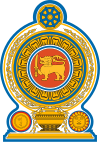National Heroes of Sri Lanka
| National Hero of Sri Lanka | |
|---|---|
 | |
| Type | Title |
| Awarded for | "An especially meritorious contribution to the historical struggle or national interests of the Democratic Socialist Republic of Sri Lanka" |
| Presented by | the President of Sri Lanka |
| Total recipients | Unknown; approximately 135 in the Island's history. |
| Precedence | |
| Next (higher) | None |
| Next (lower) | Parama Weera Vibhushanaya, Sri Lankabhimanya |
National Hero is a status an individual can receive in Sri Lanka for those who are considered to have played a major role in fighting for the freedom of the country.[1] The status is conferred by the President of Sri Lanka. The recipients of the award are celebrated on a Sri Lankan national holiday, National Heroes’ Day, held annually on 22 May. Every year, the President and general public pay tribute by observing a two minutes silence in their memory.[2] The individuals are also celebrated on Sri Lanka Independence Day, held on 4 February. In this, the President or Prime Minister will typically address the nation with a speech honouring the National Heroes. The award has only been awarded to Sri Lankan citizens, but is not limited to this group.
History of the award[]
The award of "National Hero of Sri Lanka" is currently the supreme civilian decoration in precedence in Sri Lanka.[3][4] To date, the award has only been awarded posthumously.[5]
The status of ‘Sri Lanka National Hero’ is a civil honour bestowed on an individual recognised and declared as ‘Patriotic Hero’ who fought for the freedom of the motherland.[4][6] The award focuses on those who led the Uva Wellassa Great Rebellion (1817–1818), the Matale rebellion (1948) and, the Sri Lankan independence movement.[7][8][9][10]
From 1948 to 1972, the nation was known as the Dominion of Ceylon, with its national day, known as Sri Lanka Independence Day being held annually on 4 February.[11][12] It declared itself a republic on 22 May 1972.[13] Yearly, the National Heroes are celebrated on this day.[14][15]
Recipients[]
Recipients of the award range from the 18th century to 20th century.[16] The recipients include Pandara Vanniyan, a Vanni chieftain, who died during a revolt against the British and Dutch in Sri Lanka.[17] Other recipients are 19 leaders of the Great Rebellion of 1817–18 (including Keppetipola Disawe, late Desave of Ouva), 49 participants of the Great Rebellion of 1817–18 who were sentenced to death by the Martial Court and 32 participants of the Great Rebellion of 1817–18 who were declared as "betrayers" and expelled to Mauritius by the Martial Court.[18][9][19] The final 2 groups were made national heroes on 11 September 2017.[20][21] The 19 Leaders of the Great revolution were made National Heroes on 8 December 2016.[22][23]
Matale rebellion[]
The Matale rebellion, also known as the Rebellion of 1848, took place in Ceylon against the British colonial government under Governor Lord Torrington, 7th Viscount Torrington.[24] It marked a transition from the classic feudal form of anti-colonial revolt to modern independence struggles.[25] It was fundamentally a peasant revolt.[26] For their role in the rebellion, Puran Appu and Gongalegoda Banda were made National Heroes.[27]
Sri Lankan independence movement[]
The Sri Lankan independence movement was a peaceful political movement which was aimed at achieving independence and self-rule for the country of Sri Lanka, then British Ceylon, from the British Empire.[28][29] The switch of powers was generally known as peaceful transfer of power from the British administration to Ceylon representatives, a phrase that implies considerable continuity with a colonial era that lasted 400 years.[30] It was initiated around the turn of the 20th century and led mostly by the educated middle class.[31] It succeeded when, on 4 February 1948, Ceylon was granted independence as the Dominion of Ceylon.[32][33] Dominion status within the British Commonwealth was retained for the next 24 years until 22 May 1972 when it became a republic and was renamed the Democratic Socialist Republic of Sri Lanka.[13][34] The following persons were awarded as "National Heroes of Sri Lanka" for the part they played in the Sri Lankan independence movement.
List of recipients (incomplete):[]
- Anagarika Dharmapala[35]
- C. W. W. Kannangara[35]
- D. R. Wijewardena[35]
- Don Stephen Senanayake[35]
- E. W. Perera[35]
- Fredrick Richard Senanayake[35]
- Henry Pedris[35]
- James Peiris[35]
- Ponnambalam Arunachalam[35]
- Ponnambalam Ramanathan[35]
- Tuan Burhanudeen Jayah[35]
- A. Ekanayake Gunasinha
- Arthur V. Dias
- Charles Edgar Corea
- Don Baron Jayatilaka
- George E. de Silva
- Gratien Fernando
- Henry Woodward Amarasuriya
- Herbert Sri Nissanka
- Leslie Goonewardene
- M. C. Siddi Lebbe
- Madduma Bandara Ehelapola
- N. M. Perera
- Philip Gunawardena
- S. Mahinda
- Susantha de Fonseka
- Thomas Amarasuriya
- Victor Corea
- Vivienne Goonewardene
- W. A. de Silva
- Walisinghe Harischandra
- Wilmot A. Perera
Gallery[]

D. S. Senanayake, Ceylon's first Prime Minister.

Sir Don Baron Jayatilaka, Leader of the House of the State Council of Ceylon.

The "Father of Socialism in Ceylon", Philip Gunawardena

Social reformer and Buddhist revivalist, Walisinghe Harischandra

Statesman Wilmot A. Perera, as pictured with Chairman Mao.
See also[]
References[]
Citations[]
- ^ Kennedy 2016.
- ^ Lakpura Travels 2015.
- ^ Llc, Books (September 2010). Sri Lanka Independence Struggle: Sri Lankan Independence Movement, Anagarika Dharmapala, Cocos Islands Mutiny, Matale Rebellion. General Books LLC. ISBN 978-1-157-67087-2.
- ^ a b "PressReader.com - Your favorite newspapers and magazines". www.pressreader.com. Retrieved 26 July 2020.
- ^ "Keppetipola Disawe, proclaimed national hero, posthumously: To rest in honour, at last!". Sunday Observer. 10 December 2016. Retrieved 26 July 2020.
- ^ Kennedy, Maev; agencies (9 December 2016). "From traitors to heroes: Sri Lanka pardons 19 who resisted British rule". The Guardian. ISSN 0261-3077. Retrieved 26 July 2020.
- ^ "Nineteen leaders of the Great Rebellion of 1818 declared heroes". Daily News. Retrieved 26 July 2020.
- ^ "19 Sinhalese declared 'Traitors ' by British Raj, today declared 'Heroes' | Asian Tribune". www.asiantribune.com. Retrieved 26 July 2020.
- ^ a b "Recognition of Unsung Heroes". www.dailymirror.lk. Retrieved 26 July 2020.
- ^ Options, B. T. (31 January 2016). "The long and winding road". Explore Sri Lanka – Once discovered, you must explore...... Retrieved 26 July 2020.
- ^ Mashal, Mujib (21 April 2019). "For Sri Lanka, a Long History of Violence". The New York Times. ISSN 0362-4331. Retrieved 26 July 2020.
- ^ "Language of the national anthem | Daily FT". www.ft.lk. Retrieved 26 July 2020.
- ^ a b "Ceylon Becomes the Socialist Republic of Sri Lanka". The New York Times. 23 May 1972. ISSN 0362-4331. Retrieved 26 July 2020.
- ^ Thaker, Aruna; Barton, Arlene (5 April 2012). Multicultural Handbook of Food, Nutrition and Dietetics. John Wiley & Sons. ISBN 978-1-118-35046-1.
- ^ Trawicky, Bernard (16 April 2009). Anniversaries and Holidays. American Library Association. ISBN 978-0-8389-1004-7.
- ^ Canada, Global Affairs (8 August 2014). "Cultural Information – Sri Lanka | Centre for Intercultural Learning". GAC. Retrieved 26 July 2020.
- ^ "Wanni Narratives – Part Two". Sri Lanka Guardian. Retrieved 26 July 2020.
- ^ "Nineteen leaders of the Great Rebellion of 1818 declared heroes". Daily News. Retrieved 26 July 2020.
- ^ "Sri Lanka turns 82 British-era 'traitors' national heroes". Business Standard India. Press Trust of India. 1 March 2017. Retrieved 26 July 2020.
- ^ Department of Government Printing 2017.
- ^ Kanakarathna 2017.
- ^ Department of Government Printing 2016.
- ^ Bandara 2019.
- ^ Wright, Arnold (1999). Twentieth Century Impressions of Ceylon: Its History, People, Commerce, Industries, and Resources. Asian Educational Services. ISBN 978-81-206-1335-5.
- ^ "The era of rebellion 1815-1848". www.dailymirror.lk. Retrieved 26 July 2020.
- ^ Wijesiriwardana, Panini; Silva, Nilwala de. "A look at rural life in British Ceylon". www.wsws.org. Retrieved 26 July 2020.
- ^ "The Island". www.island.lk. Retrieved 26 July 2020.
- ^ "Sri Lanka's fight for Independence". Sri Lanka News – Newsfirst. 4 February 2017. Retrieved 26 July 2020.
- ^ Llc, Books (September 2010). Sri Lanka Independence Struggle: Sri Lankan Independence Movement, Anagarika Dharmapala, Cocos Islands Mutiny, Matale Rebellion. General Books LLC. ISBN 978-1-157-67087-2.
- ^ Alagappa, Muthiah (2004). Civil Society and Political Change in Asia: Expanding and Contracting Democratic Space. Stanford University Press. ISBN 978-0-8047-5097-4.
The island gained independence in 1948 in perhaps the most orderly transfer of power in the post - World War II era.
- ^ Grant, Patrick (5 January 2009). Buddhism and Ethnic Conflict in Sri Lanka. SUNY Press. ISBN 978-0-7914-9367-0.
- ^ "Journey since Independence 1948 - 1955 - HOME". www.treasury.gov.lk. Retrieved 26 July 2020.
- ^ "Sri Lanka – Countries – Office of the Historian". history.state.gov. Retrieved 26 July 2020.
- ^ de Silva, K. M. (1972). "Srilanka (Ceylon) the New Republican Constitution". Verfassung und Recht in Übersee / Law and Politics in Africa, Asia and Latin America. 5 (3): 239–249. doi:10.5771/0506-7286-1972-3-239. ISSN 0506-7286. JSTOR 43108222.
- ^ a b c d e f g h i j k Sunday Times 2011.
Bibliography[]
- Bandara, Kelum (6 March 2019). "Ban lifted on 'Angampora': Wellessa heroes honoured". www.dailymirror.lk. Daily Mirror. Retrieved 7 March 2019.
- Kanakarathna, Thilanka (11 September 2017). "81 leaders in 1818 freedom struggle declared as national heroes". www.dailymirror.lk. Daily Mirror. Retrieved 7 March 2019.
- Kennedy, Maev (9 December 2016). "From traitors to heroes: Sri Lanka pardons 19 who resisted British rule". The Guardian. Retrieved 7 March 2019.
- Somasundaram, Daya (2010). "Collective trauma in the Vanni- a qualitative inquiry into the mental health of the internally displaced due to the civil war in Sri Lanka". International Journal of Mental Health Systems. University of Jaffna. 4: 4. doi:10.1186/1752-4458-4-22. PMID 20667090. S2CID 40442344.
- "Sri Lanka National / Independence Day". Lakpura LLC. Lakpura Travels. 15 May 2015.
- "Proclamation By His Excellency The President" (PDF). The Gazette of the Democratic Socialist Republic of Sri Lanka. Sri Lanka: Department of Government Printing. 1998/25 (Extraordinary). 21 December 2016.
- "Proclamation By His Excellency The President" (PDF). The Gazette of the Democratic Socialist Republic of Sri Lanka. Sri Lanka: Department of Government Printing. 2036/11 (Extraordinary). 11 September 2017.
- "Sri Lanka's Independence movement". www.sundaytimes.lk. Sunday Times. 30 January 2011.
- National Heroes of Sri Lanka
- Sri Lankan independence movement
- Political history of Sri Lanka
- Lists of Sri Lankan people
- Hero (title)






